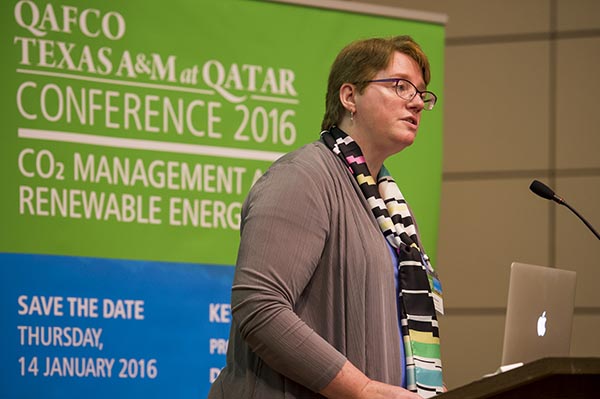
Texas A&M University at Qatar hosted experts from around the world for the annual QAFCO – Texas A&M University at Qatar Conference 2016.
The 2016 conference was the eighth presented in cooperation with Texas A&M at Qatar’s longtime industry collaborator, the Qatar Fertiliser Co. (QAFCO).
“This important conference highlights the pressing need for industry and academia to work together to develop new knowledge and create scientific solutions that have direct impact on the world around us,” said Dr. Ann Kenimer, Texas A&M at Qatar interim dean. “QAFCO has been a steadfast and dynamic partner to Texas A&M at Qatar through the years, and I thank QAFCO for its unwavering belief in the strength of our academic and research programs, our faculty, and our current and former students.”
This year’s conference focused on managing CO2 and renewable energies. Conference co-chair and Texas A&M at Qatar chemical engineering professor Dr. Konstantinos Kakosimos said that developing technology, industry and commercial applications have led to an increase in overall energy consumption, which has in turn led to two important problems: energy resources and environmental pollution.
With fossil fuels such as oil and gas diminishing, renewable energy is more important than ever. But renewables energy such as wind and solar are limited by daylight hours or windy conditions. At the same time, pollution caused by the consumption of fossil fuels — mainly due to the high emission of greenhouse gases, such as CO2 — results in a series of problems such as global warming and poor air quality.
Conference organizers said that given this dilemma, it is imperative to find new ways of managing CO2 to make emissions friendlier to the environment and our health.
QAFCO CEO Khalifa Al-Sowaidi said, “The QAFCO – Texas A&M Conference 2016 is a confluence of ideas. I believe conferences such as these can help give better insights into issues wherein institutional learnings of industry and academia can mutually benefit. I hope the conference becomes the platform for sharing ideas to find solutions for short and long-term issues facing us.”
The conference featured an impressive technical program, and sessions showcased opinions and research from some of the world’s most respected names in managing CO2 and energy. It also provided a forum for the exchange of ideas and opportunities for future collaborations.
Konstantinos said, “We are proud to have had Prof. Michael Graetzel, director of the Laboratory of Photonics and Interfaces in the Institute of Chemical Science and Engineering at the Ecole Polytechique Féderale de Lausanne (Switzerland), as keynote speaker this year, and were pleased to welcome our 14 distinguished invited speakers from the United States, Europe, Asia and Middle East.
“We hope this conference has been an outlet for exchanging scientific knowledge, sharing ideas, discussing future collaborations and building new projects. This annual conference reaffirms our pursuits of cutting-edge chemistry and chemical engineering research in Qatar and the region.”